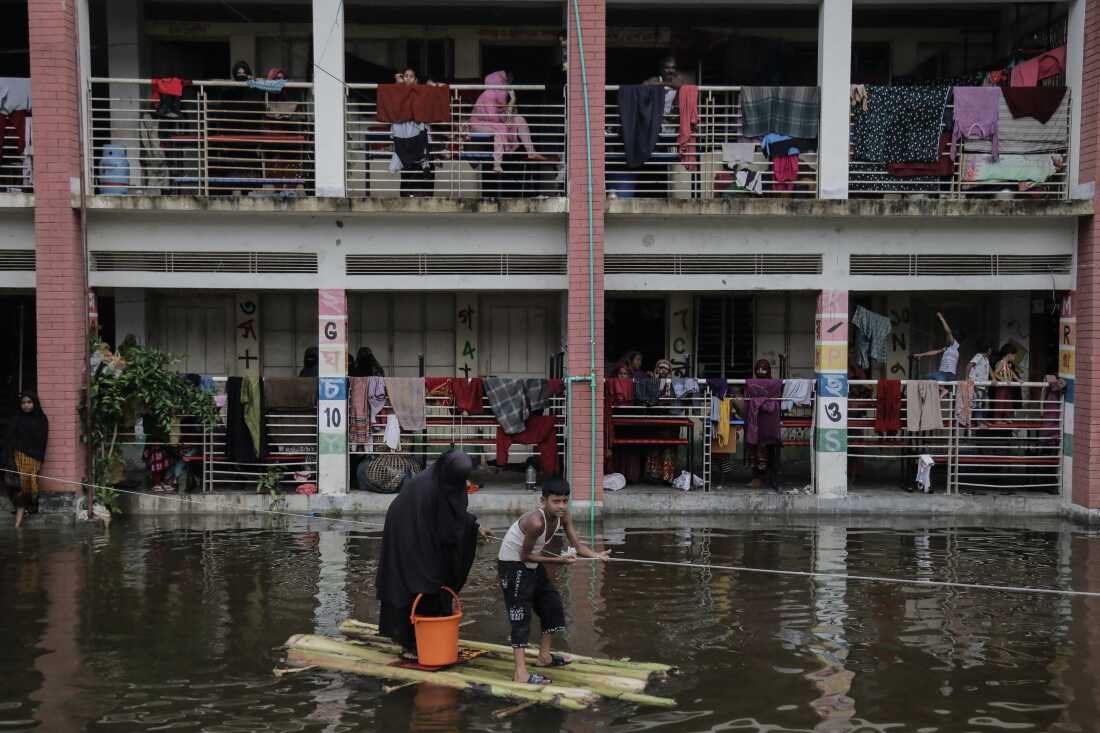
Folks displaced by floods relaxation at a reduction shelter in Mohipal, Feni, a coastal district in southeast Bangladesh on August 23.
Fatima Tuj Johora/AP
conceal caption
toggle caption
Fatima Tuj Johora/AP
NOAKHALI, Bangladesh — Nurul Haque wades slowly throughout a murky pool of water. He locations one foot cautiously in entrance of the opposite, avoiding the filth and particles that the floods have washed in. He holds his lungi, the sarong-like garment he wears to cowl his legs, as excessive as he can. Nevertheless it’s soaking by the point he reaches me.
Final month, his humble, two-room home turned submerged in 3 toes of water brought on by flash floods that swept throughout big swaths of northeastern, jap and southern Bangladesh.
Though many of the water has receded, it’s lingering in among the worst-hit areas of the nation.
Haque advised me he was terrified when the water began gushing in.

Volunteers take a motor boat to rescue folks stranded in flooded residential areas in Feni, a coastal district in southeast Bangladesh on August 24, after heavy rains prompted giant areas to be flooded in Bangladesh.
Fatima Tuj Johora/AP
conceal caption
toggle caption
Fatima Tuj Johora/AP
“When the floods happened, I was so tense,” he said. “I couldn’t sleep. I had no idea where I would go, so I took my wife and children and we went to the shelter.”
Haque is one in every of an estimated 6 million individuals who had been internally displaced following the worst floods Bangladesh has seen in additional than three many years.
Eleven in another country’s 64 districts had been affected.
Haque’s dwelling district of Noakhali is within the south of the nation. It’s a five-hour drive south from the capital, Dhaka, and it’s the place Haque has lived all his life. He stated he had by no means seen something just like the floods in his complete life.
The shelter Haque went to was one in every of hundreds dotted throughout northeastern, jap and southern Bangladesh: colleges, mosques and different public buildings offered momentary lodging for the displaced, whereas assist businesses and native volunteers distributed meals, water and primary hygiene kits.
Many houses had been washed away, whereas others had been broken past restore.
Regardless of this, most individuals had no selection however to return dwelling a number of weeks later.
Haque had deliberate to earn some cash by fishing to pay for his daughter’s wedding ceremony. “The fish have all gone,” he said. “I had hoped to marry my daughter off. The seedlings have also been washed away. Now I have nothing.”
Haque lifted his threadbare vest to indicate a deep scar — a reminder of a latest operation on his intestines. He stated his abdomen hurts when he walks via the waters.
Others with well being points have additionally suffered.
In addition they confronted different issues. Many of the males in these areas are small-scale farmers or fishermen. They discovered that the fish, their crops and seedlings had been washed away. Now they’re left with out an revenue.
Ashish Damle, Bangladesh nation director for Oxfam, defined: “The unique feature of these floods is that people did not get time to prepare themselves. They could just save their lives. The lasting impact is on their livelihoods.”
Damle additionally defined that the floods weren’t prompted merely because of the monsoon rains; industrialization has additionally performed a component.

Folks use boat made out of banana branches to commute from momentary flood shelter camp to the primary road to purchase every day important in Feni, Chittagong, Bangladesh, August 26.
Anik Rahman/Center East Photos/AFP through Getty Photos
conceal caption
toggle caption
Anik Rahman/Center East Photos/AFP through Getty Photos
“Within the last two decades, the urbanization in Bangladesh has grown more than 60%,” he stated, “which means the areas which were typically known as rural areas or typical villages are now being subjected to more industrial exposure. Urbanization means more population growth in those areas, more construction, and obviously it has an impact on the entire aquatic ecosystem.”
Thofura Bibi, 58, lives in a one-bedroom home along with her husband and 5 kids.
Through the floods, a complete facet of the home was torn aside. All that is still is a mangled mound of sopping wooden and rusty steel.
She stated strolling via the waters has infected her joints.
“I got joint pain in both my knees from walking through the water all these days,” she stated.
In lots of respects, the floods symbolize the primary vital problem for Bangladesh’s new interim authorities, headed by Nobel laureate Muhammad Yunus, to satisfy its dedication to prioritize the wants of the folks. Yunus got here to energy final month.
Native authorities official Muhammad Sarwar Uddin stated the federal government was offering 200 tons of rice and giving out money as a part of the reduction effort.
The concern now could be that there might be extra floods quickly, which the federal government will battle to fight.
Damle stated: “We are already in a climate emergency, so that means we need to have a consistent long-term sustained response. I think that level of awareness is lacking at all levels, particularly among policymakers.”
When the waters rise once more, folks like Haque would be the most affected — and most probably they are going to lose what little they’ve.



